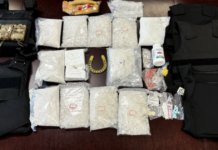One of Canada’s biggest heists remains unsolved after six months and now the two parties involved with handling the lost loot are in a bitter lawsuit over who is at fault.
Almost $24 million in gold bars and cash was stolen from Toronto’s Pearson International Airport cargo warehouse in April, using a fake waybill to claim the cargo.
The airline, Air Canada, is now at odds with Brink’s, the armoured car carrier, over who should take responsibility for the stolen goods.
Brink’s alleged in a legal filing in October that it was Air Canada’s poor security that allowed the thief to make off with the gold and cash only 42 minutes after it arrived at the airport cargo warehouse.
Air Canada countered by alleging that Brink’s shipped the gold and cash from Zurich to Toronto without declaring its value.
They also allege that security was lax because Brink’s didn’t pay for additional security nor did they add insurance to the load.
“Brink’s Switzerland Ltd did not request from or pay to Air Canada for any insurance with respect to the cargo carried under this air waybill nor, to Air Canada’s knowledge, did Brink’s Switzerland Ltd obtain any such insurance at all,” reads Air Canada’s statement of defense, adding that Brinks “elected for its own reasons not to declare a value for carriage and … not to insure these shipments” and instead paid the standard rate for the airline’s services.
The lawsuit brought forth by Brink’s says that due to the insufficient security measures at the Air Canada cargo warehouse, thieves managed to steal the gold, which weighed around 450 kg, simply by presenting a falsified waybill.
Both Air Canada and Brinks have invoked the Montreal convention, which regulates international shipments and sets a limit on compensation for lost cargo.
Air Canada claims their financial liability is capped under the convention and is calling the damage claims advanced by Brink’s “excessive” and “too remote” for a loss which was not caused by the airline.
Brink’s is arguing against a cap on compensation under the convention, claiming that no limit applies in this case because they paid extra for the shipments and had the waybills marked so that Air Canada would be made aware that the cargo contained gold bars and banknotes.
The company added that it had previously requested “special supervision” for the crates.
None of the statements or allegations filed in the lawsuit documents have been tested in the Federal Court which is hearing the case.





















